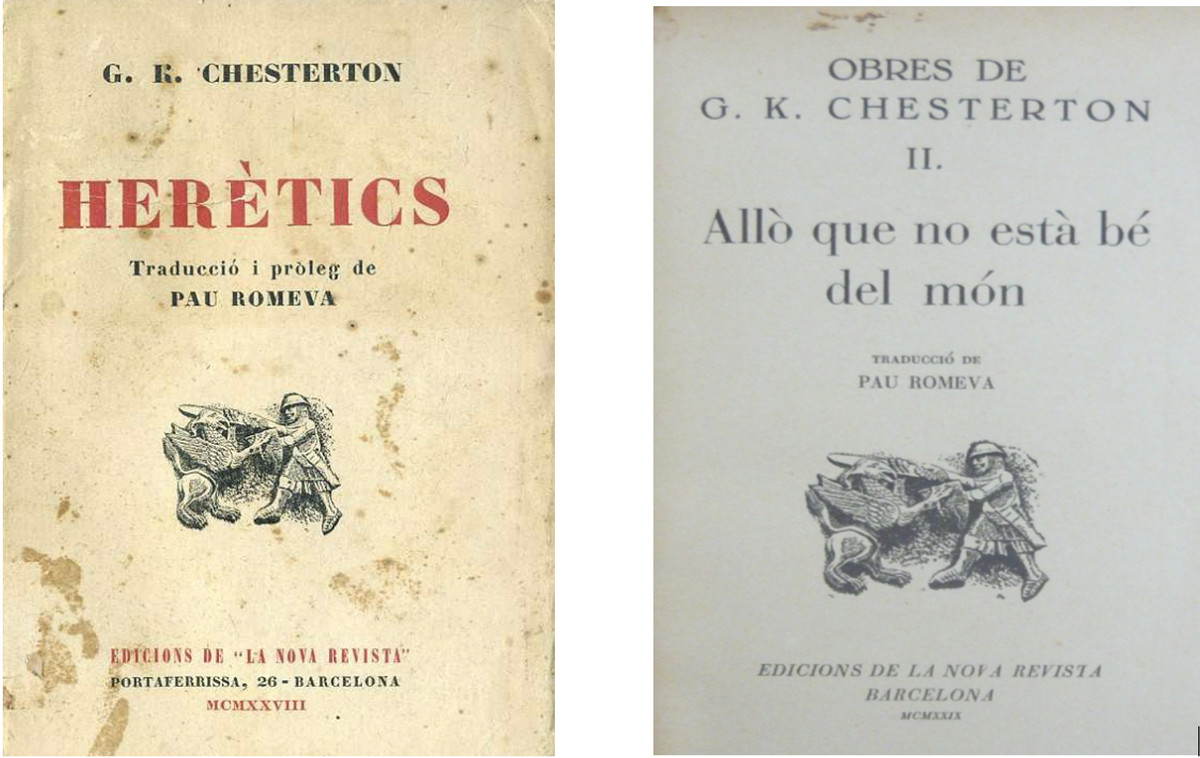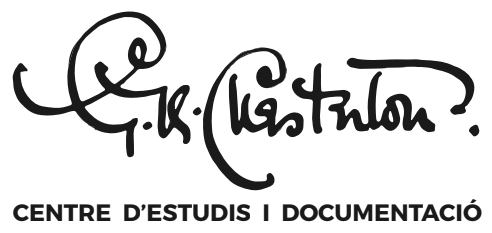Project Centre d’Estudis i Documentació G. K. Chesterton
Origin
The G. K. Chesterton Study and Documentation Centre project (CEDGKC in its Catalan initials) stems from the donation to the Facultat de Filosofia at Universitat Ramon Llull of a documental archive focused on G. K. Chesterton, and from a permanent partnership agreement with the Faculty.
Basic principles
The CEDGKC project is based in three key ideas: Chesterton’s links with Catalonia by means of his influence and repercussion on its literature, journalism and social thought; the continuity of his legacy to the present day as a result of the studies and public outreach of a generation of Catalan writers who, in the 1920’s and 30’s, received his work and circulated his thought, such as Pau Romeva, Josep Maria Junoy, Josep Maria Capdevila, Maurici Serrahima and Marià Manent, amongst others; and the creation of a documentation centre which organises archive collections related to Chesterton and his times. More than forty thousand documental units are listed in the library, the archive and its newspaper and periodicals, photography and media sections.
Aims
The CEDGCK team has established as its main aim to create a study and research site through the development of a documentation centre and a subject-arranged library, which are managed from the CEDGKC webpage. It will promote the research and study of Chesterton’s relationship with Catalonia, his influence on its literature, journalism, thought, religion and politics, and the cultural and social context of the reception of his work. Another aim of the CEDGKC is to circulate Chesterton’s work and thought, by means of study sessions and projects related to the author and his times, and to encourage links with other Chestertonian and academic institutions.
Services
The CEDGKC provides two types of services: assistance for studies and projects, and access to and reproduction of the documents. A communication channel with the CEDGKC is available to heed any inquiries and to inform of the activities programmed by the Centre, as well as those related to the area of study and to the management of the Centre.
Activities
The CEDGKC offers a wide range of activities related to, on the one hand, the study and public outreaching of Chesterton’s work, life and thought and of his literary, cultural and social context, and on the other, aspects of the British cultural and literary tradition, especially from the interwar period, through the organization of courses, sessions, lectures, subject-oriented exhibitions or international symposiums. As a Study Centre it promotes its own research projects, as well as others in collaboration with academic institutions.
Team
The project’s team is organised into three coordinated and complementary areas. The management team, consisting of Dr. Jaume Aymar (president), Dr. Sílvia Coll-Vinent (director), Mr. Marià Hispano (secretary), Mr. Josep Aranda (treasurer) and Mr. Josep Carbonell (project and activities coordinator); the scientific coordination area (Dr. Sílvia Coll-Vinent) and the technical coordination area (Marià Hispano and Josep Oller). From the outset the CEDGKC has counted on the support and the involvement of the Facultat de Filosofia at the Universitat Ramon Llull, the Ateneu Universitari Sant Pacià and the Biblioteca Pública Episcopal de Barcelona (BPEB).
Contributors: Centre d’Estudi i Documentació G. K. Chesterton (Josep Carbonell, Marià Hispano, Sílvia Coll-Vinent); Miguel Romero, Miquel Sellarès, Juan Ramón Laparra, Francesc Montero and Xavi Isern.
Translation: Ruth Mañero-Lambú Comunicació (into Spanish) and Esteve Cabré (into English).
Brief history
Raimon Galí, director of the Grup d’Estudis Coronel Guarner (GEN), asked me to give a paper on Chesterton for the 2000 course. In his own words he told me:
You should answer two questions: who brought Chesterton to Catalonia and for what reason.
To answer these questions a bibliographic search was started. The country’s libraries, archives and bookshops (second-hand and other) were researched. Works edited by Plaza & Janés in the 1960’s and 70’s were found, along with some volumes by Chesterton translated into Catalan in the 1930’s. Jordi Galí and Dr. Dídac Parellada had published respectively El compromís politic de Chesterton and Recordatori a Chesterton to coincide with the 100th anniversary of his birth. To be fair, bibliography related to Chesterton’s two stays in Catalonia was scarce.

Access to the internet facilitated a worldwide bibliographic search. Chesterton being a prolific and multi-faceted writer, a whole Chestertonian universe was opened. He published some ninety books and around four thousand articles. Apart from being a writer who pursued many literary genres, he was renowned as a polemicist and an apologist. Following with the research, the catalogues of universities, national libraries, archives and foreign collections were examined. Visits were made to Italy, France and Madrid. In Rome, documents were obtained from several public or Catholic universities, and the Biblioteca Nazionale Centrale. In Paris and Lyon an extensive volume of articles, essays and literary reviews were obtained. In Madrid, documents were examined in the Archivo General de la Administración (Alcalá de Henares) on Francoist censorship and Chesterton’s published work; in the Hemeroteca and the Residencia de Estudiantes, documentation was researched related to his stay in Madrid and the lecture he gave there in the spring of 1926, before going to Barcelona. A subject-arranged library was created. Works by Chesterton, biographies or books about the writer were acquired in Argentina, Mexico, Italy and France. The publishing houses Acantilado, Renacimiento and Valdemar started publishing works not available in Spanish up to that point. As the size of the document collection grew, a new systematic organization was needed. The worldwide research permitted at the same time to establish contacts with other associations from abroad, such as Les Amis de G. K. Chesterton of Philippe Maxence, the Società Chestertoniana Italiana of Marco Sermarini or Chesterton Institue for Faith and Culture at Seton Hall University.
An agreement was reached with Dr. Jaume Aymar, then dean of the Facultat de Filosofia at the Universitat Ramon Llull, to carry out the donation of the documental collection to the Universitat Ramon Llull and begin the work and coordination of the G. K. Chesterton Study and Documentation project.
Josep Carbonell i Rodés
